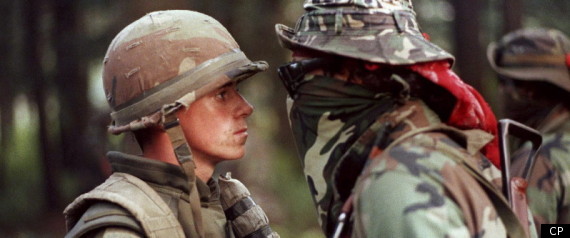 WINNIPEG - Native chiefs say Prime Minister Stephen Harper must come out of this month's First Nations summit willing to forge a new relationship with aboriginals or risk widespread unrest.
WINNIPEG - Native chiefs say Prime Minister Stephen Harper must come out of this month's First Nations summit willing to forge a new relationship with aboriginals or risk widespread unrest.Chiefs from Alberta, Saskatchewan, Manitoba and Ontario gathered in Winnipeg on Wednesday to talk strategy before the summit in Ottawa on Jan. 24. Many have concerns about the lack of housing, clean running water and education in their communities, but virtually all say they don't expect to solve those issues in a day.
They want the prime minister to commit to holding at least one first ministers meeting on aboriginal issues and to appoint a commissioner to ensure that treaties signed more than 100 years ago are being followed.
Grand Chief Derek Nepinak, head of the Assembly of Manitoba Chiefs, said Third-World conditions in native communities are a symptom of the unequal relationship between aboriginals and the Crown. Harper must take immediate action following the summit or frustrated young people will start taking matters into their own hands, he warned.
"Our young people are fed up with the way things are," Nepinak said. "We've made several attempts to deal with this through diplomatic means and political means, but we're reaching a point where the winds have shifted.
"People are frustrated. If diplomacy fails, we can't speak for what happens beyond that."
Harper announced the long-awaited summit last month when a housing crisis in the Cree community of Attawapiskat became high profile. First Nations chiefs had been asking for such a meeting since the summer of 2010. Harper called it a "historic" opportunity to discuss the challenges and opportunities facing aboriginal people.
The summit is only for one day and Nepinak said First Nations are tired of being trotted out for photo opportunities. They want to see some real change.
"It's a small window of opportunity. We're going to do our best to kick that window in."
Grand Chief Stan Beardy, who represents dozens of northern Ontario First Nations, said the treaties signed by his ancestors promised to share the land and its resources, yet his people live in poverty while governments make millions off the north's natural resources.
Beardy said he has managed to convince some people to give diplomacy a chance, but that hasn't paid off so far.
"With the information highway, a lot of my young people have access to information today," said Beardy, head of Nishnawbe Aski Nation. "They know what their basic human rights are. They know what their legal rights are. It's no longer possible to keep us in the dark and continue to exploit our natural resources without (sharing)."
First Nations have waited for a century to be treated equally, Beardy continued. They aren't going to wait much longer.
"We're very, very patient people. Being nice is not helping me today. I think I need to stand up and say it's time."
Perry Bellegarde with the Little Black Bear First Nation in Saskatchewan said he and his colleagues want to set up a way to give First Nations better access to the prime minister and premiers on an ongoing basis.
Treaties, human rights declarations and royal commissions are just gathering dust, he said. There must be a system in place that ensures native people are treated fairly.
"The rest of Canadian society doesn't see — or doesn't want to see — that there are Third-World conditions in this country and that's not acceptable," Bellegarde said.
"We're not a minority. We're indigenous peoples."
Original Article
Source: Huff
No comments:
Post a Comment